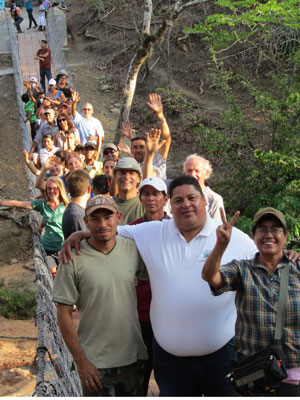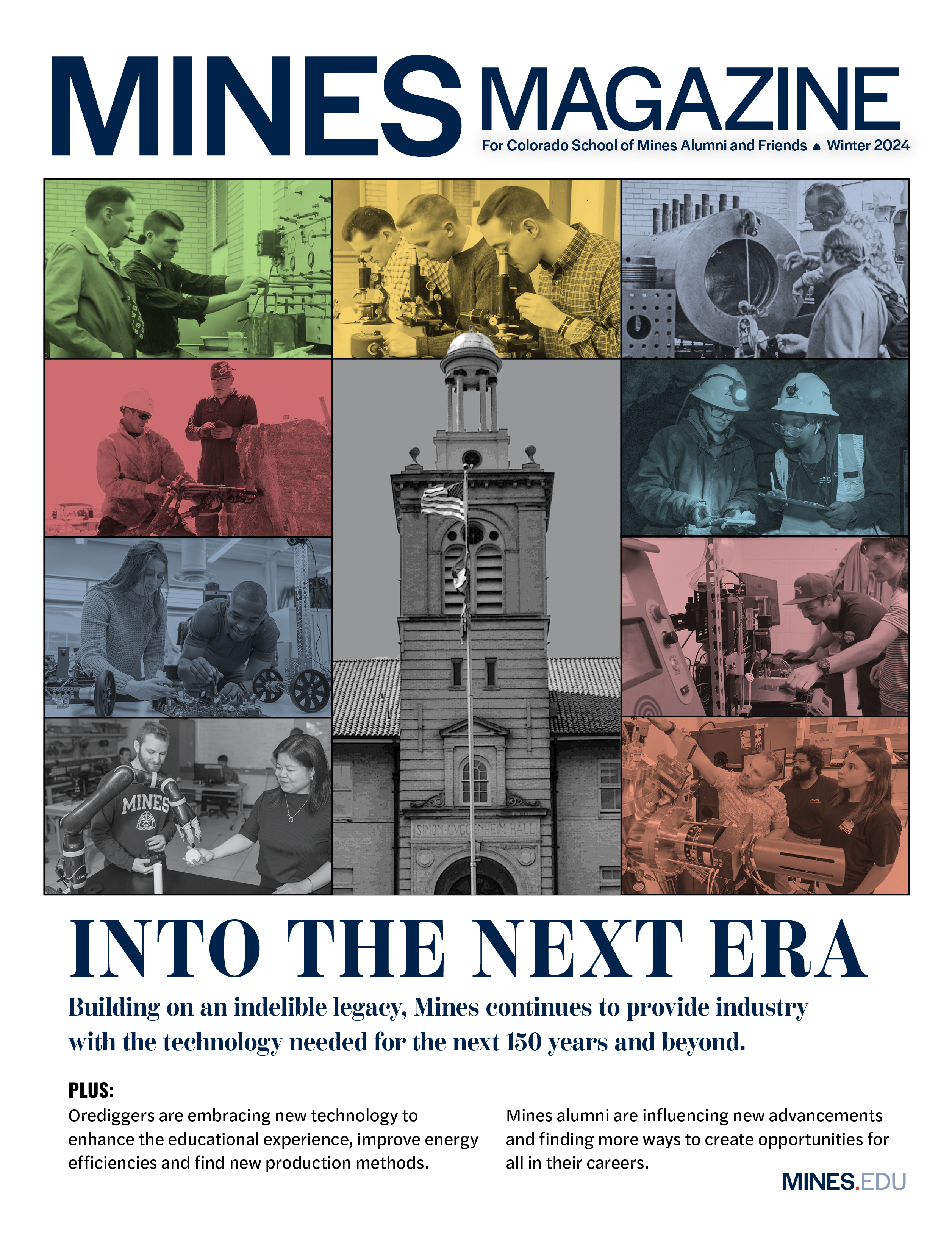 A group of Mines students representing Engineers Without Borders-USA (EWB) and Bridges to Prosperity (B2P)�traveled to the small community of Los Gomez in Nicaragua to complete a pedestrian footbridge over the frequently flooded Rio Ochomogo River. The bridge had been under development since September 2011. The group included six students, a faculty mentor and a professional mentor, their fields of study ranging from civil to humanitarian to chemical engineering, all of whom donated their spring breaks to this effort. On this trip, the fourth to the small community over the last year, the team hand mixed and poured two concrete anchors, strung five steel cables, and laid the decking and fencing of the 42-meter pedestrian footbridge, giving the community of Los Gomez year-round access to health care and education in a nearby town.
A group of Mines students representing Engineers Without Borders-USA (EWB) and Bridges to Prosperity (B2P)�traveled to the small community of Los Gomez in Nicaragua to complete a pedestrian footbridge over the frequently flooded Rio Ochomogo River. The bridge had been under development since September 2011. The group included six students, a faculty mentor and a professional mentor, their fields of study ranging from civil to humanitarian to chemical engineering, all of whom donated their spring breaks to this effort. On this trip, the fourth to the small community over the last year, the team hand mixed and poured two concrete anchors, strung five steel cables, and laid the decking and fencing of the 42-meter pedestrian footbridge, giving the community of Los Gomez year-round access to health care and education in a nearby town.
Assisting communities outside the U.S. with sustainable development projects, EWB/B2P Mines is a student-led campus club underpinned by six core values: integrity, service, collaboration, ingenuity, leadership and service. In addition, the club participates at a local level in a variety of on- and off-campus events, including Relay for Life, Up Til Dawn and many Habitat for Humanity builds.
Todd Wang ’86, a mentor for the club and a Bridges to Prosperity Technical Advisory Board member, recognizes the students efforts and ability to persevere through various challenges, as well as the nights and weekends of hard work that led up to the bridge’s completion. Since retiring from the U.S. Army in 1987, Wang has overseen the completion of four pedestrian footbridge projects by various student volunteer organizations. “I really enjoy working with the students and empowering them to make a difference,” he says. “I hope they can pass on this mentality.”
Barbara Anderson ’13, who studied civil engineering, recounts her experience nearing the end of the bridge completion: “As we began putting the decking on the bridge, we were able to muster a lot of community support and could tell that the community members, even the ones who didn’t come to the worksite, were getting really excited for their bridge to be completed. Kids would walk by on their way home from school and just watch us work on the bridge for hours and, as soon as we left, would play on it. At the end of the week, we had an opening ceremony for the bridge with the whole community. It was an awesome experience to see all the people who had worked with us, fed us and welcomed us into their homes gather together and celebrate the success of their project.”
EWB-USA tries to foster the sustainable development of communities by providing more than a capital donation (for instance, a bridge); it works to grow the sustainability of a community. Members of the organization claim that their success comes from the way they foster community-driven projects that require an investment either of time or a portion of the project cost. The result is a community that demonstrates ownership of and pride in a project, which ultimately creates a stronger and more sustainable community.
Bridges to Prosperity is a nonprofit organization dedicated to providing isolated communities around the world with safe, reliable passage across rivers and gorges. On this project in Nicaragua, it provided tested, reliable bridge designs that were site-adapted by the Mines students to ensure that the bridge will serve the community for decades. B2P also provided the group with donated cable to support the bridge, considerably reducing the capital cost to the student organization.
Despite the long, hard days faced by the team, there was time to talk with the locals and feast on home-cooked meals. Students report that the most memorable experiences were those grounded in the creating and building of relationships. Jake Montgomery, a sophomore studying civil engineering, says of his experience in Nicaragua, “We worked some very long days, sometimes throwing rocks and sometimes mixing concrete. On these days lunch was rather light, so when 6 o’clock rolled around, we headed to wherever we were eating that night and were ready for food. Now, at these dinners there was always a decent variety of food, ranging from plantains to chayote and even homemade tortillas, of which everyone would be careful to take just enough of each dish to allow everyone else to get some. But when the rice and beans hit the table, this was never a concern, there was always more than the group could eat, and with this new-found freedom, we feasted.”
Following evening meals, the team sometimes enjoyed community events. On New Year’s Eve students danced with community members to ring in the new year.
Looking forward, EWB/B2P Mines is planning a similar project in the neighboring community of La Conquista. The new project is expected to take an innovative approach by partnering with a local university, involving their engineering students in the hands-on work of designing and constructing a pedestrian bridge with EWB/B2P Mines. The opportunity not only allows the students to apply their knowledge of engineering to a real-world problem, but also creates a pathway for future projects and ongoing relationships.
Read the unedited original article from The Oredigger.
Read about the reconnaissance trip students took with Todd Wang �86 over the 2011-2012 winter break.


